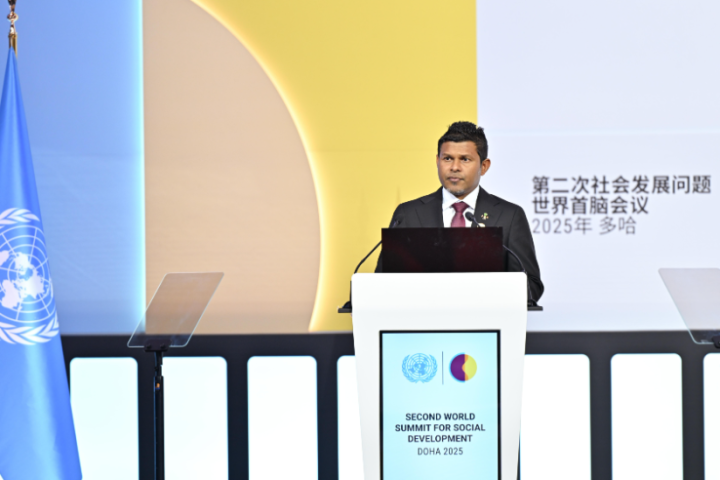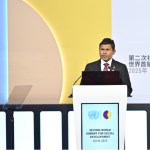MALE’, Maldives —First Lady Sajidha Mohamed on Tuesday implored young Maldivians to channel their innate talents into practical skills, warning that true national progress hinges on “minds and hands” sharpened by discipline and innovation. Speaking at the inauguration of “Skillfest,” a three-day open house event at the Maldives Polytechnic here, Sajidha Mohamed framed the gathering as a pivotal moment for a generation poised to sustain the country’s economic vitality. The event coincides with the institution’s 50th anniversary and features interactive stalls showcasing vocational programs in fields from engineering to hospitality — disciplines vital to an economy reliant on tourism and maritime industries.
“A country can only be rebuilt and developed if minds and hands are developed and intelligence and products are enhanced,” Sajidha Mohamed said. The First Lady’s address underscored a broader narrative of resilience in the Maldives, where climate change and global shifts have long tested adaptability. She evoked the ingenuity of past generations — master boatbuilders and fishermen who “rose up to meet every change that came” — as a blueprint for today’s youth. “The previous generations of Maldivians equalled that change,” she added, praising their productivity on the high seas, where Maldivian crews have historically punched above their weight in regional fisheries.
Skillfest, organized by the polytechnic to “produce competent, indigenous youth” and raise awareness of vocational education’s role, opens its doors to the public for hands-on workshops and career counselling. Sajidha Mohamed, highlighted the event’s accessibility: “The opportunity to learn the jobs and skills that can be developed at the Maldives Polytechnic is open to everyone.” She urged attendees to seize these chances for “a happy, productive and dignified life.”
The polytechnic itself traces its roots to October 14, 1975, when it began as the Vocational Training Centre, a modest initiative to equip islanders with trades amid the Maldives’ transition from subsistence fishing to modern development. By 2010, it had evolved into the Maldives Polytechnic under a presidential decree, consolidating programs across six faculties, including the Faculty of Engineering Technology.
That unit, born from a 1990 agreement during Indian Prime Minister V.P. Singh’s visit to Malé, saw its foundation stone laid by then-President Maumoon Abdul Gayoom in 1993.
Originally the Maldives Institute of Technical Education, it now trains hundreds annually in disciplines like automotive repair and renewable energy systems — skills increasingly critical as the nation invests in solar power to combat rising seas.
Over five decades, the institution has graduated thousands, fostering entrepreneurship in a country where small businesses drive 90 percent of employment. Sajidha Mohamed lauded its “efforts… to promote skills and entrepreneurship,” thanking past and present staff for their role in nation-building. “Building a nation requires ideas and productivity,” she concluded.
The ceremony drew dignitaries including Dr. Ali Haider Ahmed, the minister of higher education, labour and skills development, alongside polytechnic officials and foreign guests.
Sajidha Mohamed formally unveiled a commemorative board marking the anniversary and received a souvenir from the institution before mingling with exhibitors.
As Skillfest unfolds, it arrives at a juncture when the Maldives, under President Dr. Mohamed Muizzu, is prioritizing “Maldivianization” of jobs traditionally held by expatriates, particularly in construction and tourism. With enrolment in vocational programs up 20 percent since 2020, events like this signal a quiet pivot: from elite university tracks to hands-on pathways that could anchor the nation’s future amid existential environmental threats.












